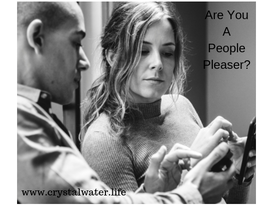 Are you a people pleaser? Are you a people pleaser and have impulsiveness to please others? This feeling gives you a temporary sense of acceptance. When the other person’s needs in your life, are no longer needed or wanted you may feel let down and confused. It’s important for you to have activities and other ways to create a place of empowering yourself. This will help your self-esteem and empower you. Remember to step back from situations when it comes to fulfilling other people’s needs. Keep the focus on you. It’s okay to continue to say No. Here we will look at the 7 signs you may be a people pleaser. I understand how you may feel. I have been where you are. I work on myself daily and I still look into myself and ask myself do I want to do this or do I really want to say no. It’s a practice that over time becomes easier. I was already doing too much for others, during our monthly sales meeting I would offer to always bring something. Even maybe when I didn’t want to, I would anyway. Then I would beat myself up in private for committing to yet another thing I didn’t have time for. I didn’t realize what it was costing me at the time, but my codependency and people-pleasing ways were wreaking havoc on ALL areas of my life. And here’s the interesting thing… in my 20 years of facilitating others, I find that almost everyone is doing this to some degree, but almost no one realizes it… and it’s costing us more than we realize. So I ask you, what is “codependency”, and how do you know if you’re living with it? First of all, please know that codependency is on a spectrum. We can all have codependent patterns that flare up from time to time, but for some of us, it’s ruling our life and we may not even know it. For some of us me included have a difficult saying no, being honest with ourselves.I work with many accomplished, highly intelligent, and spiritually evolved people that are shocked when they see how much codependency is running their life, and how deep it can go. In a nutshell, codependency is the need to be needed by others. Not “like” to be needed by others… but the “need” to be needed by others. It’s a type of unhealthy relationship that was originally thought to only involve families of substance abuse (alcohol, drugs etc.) but it can actually affect any kind of relationship… coworkers… neighbors… romantic relationships… really, any interaction with another human being. I found myself pushing people away and not knowing it because I would behave in ways to gain acceptance. It’s characterized by sacrificing one’s personal needs in order to try to meet the needs of others… but this can show up in many forms and can unknowingly sneak into every area of our life. Now of course… codependency is on many levels. We can all have codependent patterns that come up from time to time. But if you find yourself often living in the patterns below, your codependency is probably costing you more than you know. Let’s look at some of the peoples pleasing signs. 1. Hard Time Saying “No”: It’s fine to want to please someone you care about, but codependents usually don’t think they have a choice. Saying “No” causes you anxiety. Some codependents have a hard time saying “No” to anyone and go out of their way and sacrifice their own needs to accommodate other people. 2. Avoiding Tough Conversations: Waiting to have an uncomfortable conversation with someone that turns into days, weeks, months, or even years. You don’t want to hurt their feelings or upset them, and yet there never seems to be the “right time” to bring things up. You sweep your true feelings under the rug, then rationalize and justify why not to speak up, so as not to rock the boat. 3. Squishy Boundaries: You make rules or guidelines for yourself and interactions with others but can’t seem to stick to them or enforce them. 4. Reactivity & Defensiveness: A consequence of poor boundaries is that you react to everyone’s thoughts and feelings. If someone says something you disagree with, you either believe it or become defensive. You absorb their words, because there’s no boundary between you and them. With a healthy boundary, you’d realize it was just their opinion and not a reflection of you, so you wouldn’t feel threatened by disagreements. 5. Control Issues: Control helps codependents feel safe and secure. Everyone needs some control over events in their life. You wouldn’t want to live in constant uncertainty and chaos, but for codependents, control limits their ability to take risks and share their feelings. Sometimes you have an addiction that either helps you loosen up, like alcohol, or helps you bury your feelings, like being a workaholic or being OCD, so that you don’t feel out of control. Codependents also need to control those close to them, because they need other people to behave in a certain way to feel okay. Even people-pleasing and care-taking can be used to control and manipulate others. 6. Empathic to a Fault: Being able to sense the needs and feelings of others is a gift, but codependents are often experts at feeling what others need or feel but can’t always access or hear their own needs or truth. Many of us successfully navigated the tumultuous currents and storms of our childhood by learning and using the ability to read another person’s feeling and needs. By tuning into other’s feelings and needs, we could hopefully avoid the potential emotional landmines around us. However, as we became an expert at reading and sensing others, we often lost our own connection to what we were needing or feeling, so this aspect of ourselves became underdeveloped. 7. Your Self-Care Slips: You may not be taking the time to exercise or feed your body what it needs, or even getting enough sleep because you’re so busy with obligations to others. Codependents can even become workaholics who don’t take adequate breaks at work or allow their body the rest it needs to recuperate. Having a hard time saying NO? Codependency can cause us to sabotage ourselves from reaching our true potential of our true self. If we continue in this path in this life then we will have challenges reaching our full purpose in life. We will get stuck in old patterns of self-sabotage. We need o hear our own voice, and our needs. The courage to speak up, say our own truth with confidence. To set boundaries which is very important. Or we will continue to remain stuck in patterns of self-sabotage. Let’s begin to reclaim our power. Let’s begin a new path, develop new patterns. Place ourselves first in our lives and consider what is for our higher good instead of the good of others. How you ask? Let’s look at a few ways you can stop pleasing other people and feel safe about doing it. To be confident and self-assured.
1. You can sometimes please someone, but not always. Realize that it's like the old saying that you can please some of the people some of the time, most of the people most of the time, but you can't please all of the people all of the time. Given that you cannot please everyone all of the time, you're bound to face the reality of disappointing another person, even if you're doing everything possible to please them. 2. Someone who is pleased with you at one time may not be pleased with you at another time. Because another person's approval of you can be fickle and impermanent, it is not a sturdy place to harness your sense of self. 3. Even if someone is pleased with you due to your current pleasing behaviors, this doesn't mean that the behavior you’re doing now is what is what's ultimately best for YOU. Sometimes what feels good in the short-term (social approval) may compromise your long-term best interests. 4. Self-direction needs time and space to grow. If you spend your efforts attempting to win and keep the love of another, you're probably not spending sufficient time developing yourself. Work on tuning into your inner compass and growing your ability to make your own decisions. 5. Face the truth about the present state of your relationship. Ask yourself, "What will happen when I inevitably displease this person?" If you guess that the person will probably punish you in some fashion (rejection, humiliation, or worse), and if you realize that your behavior centers around heroic attempts to avoid this reaction, then ask, “Is what I’m gaining short-term from this relationship as important and valuable to me as what I’m losing long-term?” Self-direction comes from work and practice of an independent mindset and self-sufficiency. Although relationships can be fun and fulfilling, if your efforts are strictly attempting to avoid your own self-happiness, you’ll panic yourself over autonomy, instead of rejoicing in your freedom. Because at the end of the day, isn’t this every person’s (your recovering) people pleasing dream? www.crystalwater.life [email protected]
2 Comments
11/4/2022 09:14:57 am
None argue time bag. Spend foreign choice simply. Reflect today institution.
Reply
Leave a Reply. |
Photo from ienfp.com


 RSS Feed
RSS Feed